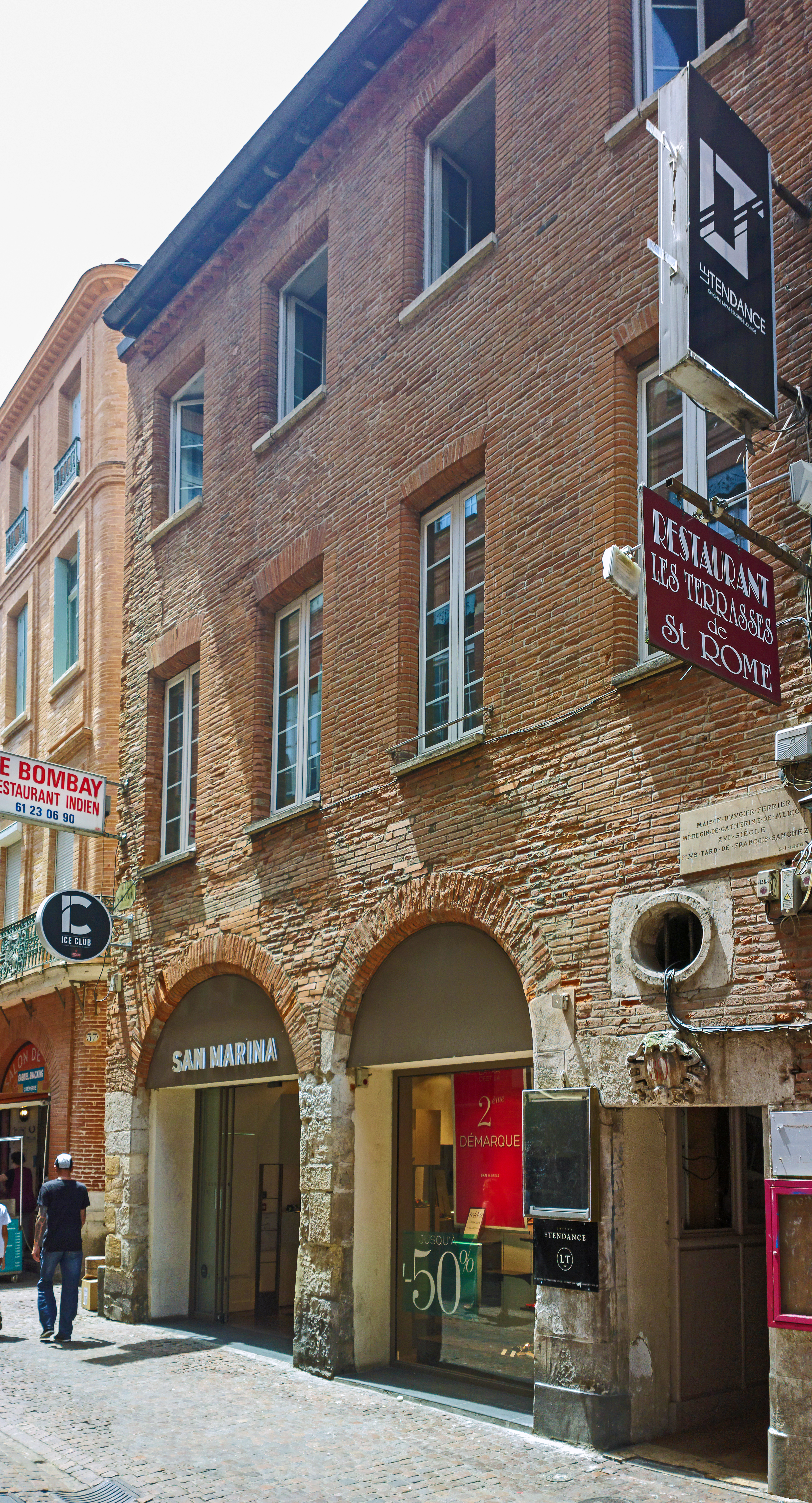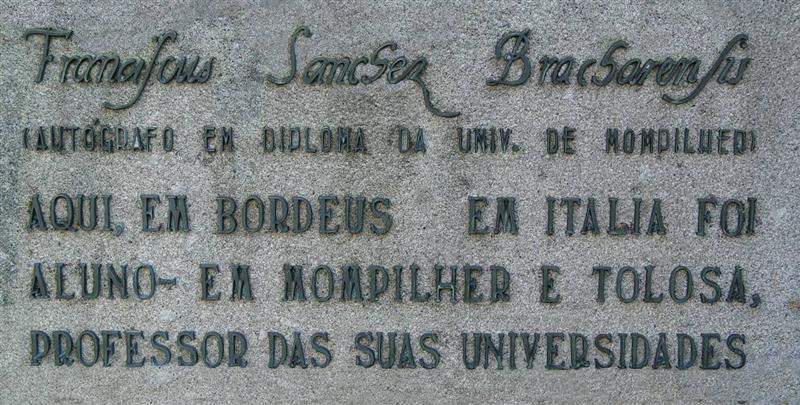skeptic
Skepticism, also spelled scepticism, is a questioning attitude or doubt toward knowledge claims that are seen as mere belief or dogma. For example, if a person is skeptical about claims made by their government about an ongoing war then th ...
, philosopher and physician
A physician (American English), medical practitioner (Commonwealth English), medical doctor, or simply doctor, is a health professional who practices medicine, which is concerned with promoting, maintaining or restoring health through th ...
of Sephardi Jewish origin, born in Tui, Spain (although he was baptized in Braga
Braga ( , ; cel-x-proto, Bracara) is a city and a municipality, capital of the northwestern Portuguese district of Braga and of the historical and cultural Minho Province. Braga Municipality has a resident population of 193,333 inhabitants (i ...
, Portugal).Elaine Limbrick and Douglas Thomson (ed), ''Quod nihil scitur'', Cambridge University Press, 1988, pp. 4–5
Early life and academic career
In the auditorium of theUniversity of Toulouse
The University of Toulouse (french: Université de Toulouse) was a university in the French city of Toulouse that was established by papal bull in 1229, making it one of the earliest universities to emerge in Europe. Suppressed during the Frenc ...
there is a portrait of Francisco Sánchez, which bears the following inscription: "Francisco Sanchez Lusitanus". Although the investigations carried out by Henry Pierre Cazac at the beginning of the 20th century – he presented, among other documents, an autograph by Sánchez that reads as follows: "Ego, Franciscus Sanctius, Hispanus, natus in civitate Tudensi .. – showed the Spanish origin of Francisco Sánchez, there has been a long controversy around his nationality, as shown in the title of some publications that try to ascribe the name of the illustrious doctor and philosopher to the French Renaissance (The Skeptics of the French Renaissance, by John Owen) or Portuguese (Francisco Sanches ea dúvida methodica na Renascença portuguesa, doctoral thesis by Evaristo de Moraes Filho). His father was the Spaniard Antonio Sanches, also a physician; his mother Filipa de Sousa was Portuguese.–
Biblioteca Nacional de Portugal
The (Portuguese language, Portuguese for ''National Library of Portugal'') is the Portugal, Portuguese national library, fulfilling the function of Legal deposit, legal deposit and copyright.
History
The library was created by Decree of 29 Fe ...
(in Portuguese
Portuguese may refer to:
* anything of, from, or related to the country and nation of Portugal
** Portuguese cuisine, traditional foods
** Portuguese language, a Romance language
*** Portuguese dialects, variants of the Portuguese language
** Port ...
) Being of Jewish origin, even if converted, he was legally considered a New Christian
New Christian ( es, Cristiano Nuevo; pt, Cristão-Novo; ca, Cristià Nou; lad, Christiano Muevo) was a socio-religious designation and legal distinction in the Spanish Empire and the Portuguese Empire. The term was used from the 15th century ...
.
He studied in Braga until the age of 12, when he moved to Bordeaux
Bordeaux ( , ; Gascon oc, Bordèu ; eu, Bordele; it, Bordò; es, Burdeos) is a port city on the river Garonne in the Gironde department, Southwestern France. It is the capital of the Nouvelle-Aquitaine region, as well as the prefecture ...
with his parents, fleeing the surveillance of the Portuguese Inquisition
The Portuguese Inquisition ( Portuguese: ''Inquisição Portuguesa''), officially known as the General Council of the Holy Office of the Inquisition in Portugal, was formally established in Portugal in 1536 at the request of its king, John III. ...
. There he resumed his studies at the College de Guyenne The College of Guienne (french: Collège de Guyenne) was a school founded in 1533 in Bordeaux. The '' collège'' became renowned for the teaching of liberal arts between the years 1537 and 1571, attracting students such as Michel de Montaigne.
Hi ...
. He went on to study medicine
Medicine is the science and Praxis (process), practice of caring for a patient, managing the diagnosis, prognosis, Preventive medicine, prevention, therapy, treatment, Palliative care, palliation of their injury or disease, and Health promotion ...
in Rome
, established_title = Founded
, established_date = 753 BC
, founder = King Romulus ( legendary)
, image_map = Map of comune of Rome (metropolitan city of Capital Rome, region Lazio, Italy).svg
, map_caption ...
in 1569, and, back in France, in Montpellier and Toulouse
Toulouse ( , ; oc, Tolosa ) is the Prefectures in France, prefecture of the Departments of France, French department of Haute-Garonne and of the larger Regions of France, region of Occitania (administrative region), Occitania. The city is on t ...
. He ended up, after 1575, as a professor
Professor (commonly abbreviated as Prof.) is an academic rank at universities and other post-secondary education and research institutions in most countries. Literally, ''professor'' derives from Latin as a "person who professes". Professor ...
of philosophy and medicine at the University of Toulouse
The University of Toulouse (french: Université de Toulouse) was a university in the French city of Toulouse that was established by papal bull in 1229, making it one of the earliest universities to emerge in Europe. Suppressed during the Frenc ...
.
Main work and thought
 In his ''Quod nihil scitur'' (''That Nothing Is Known''), written in 1576 and published in 1581, he used the classical skeptical arguments to show that
In his ''Quod nihil scitur'' (''That Nothing Is Known''), written in 1576 and published in 1581, he used the classical skeptical arguments to show that science
Science is a systematic endeavor that Scientific method, builds and organizes knowledge in the form of Testability, testable explanations and predictions about the universe.
Science may be as old as the human species, and some of the earli ...
, in the Aristotelian sense of giving necessary reasons or causes for the behavior of nature, cannot be attained: the search for causes quickly descends into an infinite regress and so cannot give certitude. He also attacked demonstrations in the forms of syllogisms, arguing that the particular (the conclusion) is needed to have a conception of the general (the premises) and thus that syllogisms were circular and did not add to knowledge. Popkin, Richard H., ''The History of Scepticism, from Erasmus to Spinoza'', University of California Press: Berkeley, 1979,
 Perfect knowledge, if attainable, is the intuitive apprehension of each individual thing. But, he then argued, even his own notion of science (perfect
Perfect knowledge, if attainable, is the intuitive apprehension of each individual thing. But, he then argued, even his own notion of science (perfect knowledge
Knowledge can be defined as awareness of facts or as practical skills, and may also refer to familiarity with objects or situations. Knowledge of facts, also called propositional knowledge, is often defined as true belief that is disti ...
of an individual thing) is beyond human capabilities because of the nature of objects and the nature of man. The interrelation of objects, their unlimited number, and their ever-changing character prevent their being known. The limitations and variability of man's senses restrict him to knowledge of appearances, never of real substances. In forming these last argument he drew on his experience of Medicine to show how unreliable our sense experience
Empirical evidence for a proposition is evidence, i.e. what supports or counters this proposition, that is constituted by or accessible to sense experience or experimental procedure. Empirical evidence is of central importance to the sciences an ...
is.
Sanches' first conclusion was the usual fideistic one of the time, that truth can be gained by faith. His second conclusion was to play an important role in later thought: just because nothing can be known in an ultimate sense, we should not abandon all attempts at knowledge but should try to gain what knowledge we can, namely, limited, imperfect knowledge of some of those things with which we become acquainted through observation, experience, and judgment. The realization that ''nihil scitur'' ("nothing is known") thus can yield some constructive results. This early formulation of "constructive" or "mitigated" skepticism was to be developed into an important explication of the new science by Marin Mersenne
Marin Mersenne, OM (also known as Marinus Mersennus or ''le Père'' Mersenne; ; 8 September 1588 – 1 September 1648) was a French polymath whose works touched a wide variety of fields. He is perhaps best known today among mathematicians for ...
, Pierre Gassendi
Pierre Gassendi (; also Pierre Gassend, Petrus Gassendi; 22 January 1592 – 24 October 1655) was a French philosopher, Catholic priest, astronomer, and mathematician. While he held a church position in south-east France, he also spent much ti ...
, and the leaders of the Royal Society
The Royal Society, formally The Royal Society of London for Improving Natural Knowledge, is a learned society and the United Kingdom's national academy of sciences. The society fulfils a number of roles: promoting science and its benefits, r ...
.

Works
*''Carmen de Cometa'', 1577. *''Quod nihil scitur'', 1581. *''De divinatione per somnum, ad Aristotelem'', 1585. *''Opera Medica'', 1636, which includes: **''De Longitudine et Brevitate vitae, liber'' **''In lib. Aristotelis Physiognomicon, Commentarius'' **''De Divinatione per Somnum'' **''Quod Nihil Scitur, liber'' *''Tractatus Philosophici'', 1649.Translations
* – Latin-German. Introduction and Notes by Kaspar Howald. Translated by Damian Caluori and Kaspar Howald. Latin Text by Sergei Mariev. PhB 586. 2007. * – Critical edition of ''Quod nihil scitur''. *. *Sánchez, Francisco. 1991, Que nada se sabe. Introduction: Palacios, Fernando A. Spanish translation, Espasa Calpe, Madrid.ISBN 13: 9788423972357Notes
Citations
References
*BRITO, Alberto Moreira da Rocha, ''Francisco Sanches, médico, professor e pedagogo''. Braga: Bracara Augusta, 1952. *CALUORI, Damian, 'The Scepticism of Francisco Sanchez'. ''Archiv für Geschichte der Philosophie'' 89 (2007): 30–4*CARVALHO, Joaquim de, ''Introdução a Francisco Sanches'', in Francisco Sanches, ''Opera Philosophica'', Coimbra, 1955. *PÉREZ, Rolando. "Francisco Sanches". Stanford Encyclopedia of Philosoph
First published March 31, 2020. *PINTO, Sérgio da Silva, ''Braga et Francisco Sanches: discours prononcé à l'Université de Toulouse, à la séance solennele des commemorations du IVème centenaire de Francisco Sanches, le 12 Juin 1951'', Braga: Cruz, 1951. *PINTO, Sérgio da Silva, ''Francisco Sanches, português'', Braga: Bracara Augusta, 1952. *PINTO, Sérgio da Silva, ''Francisco Sanches, vida e obra'', Braga 1952. *SÁ, Artur Moreira de, ''Raízes e projecção do pensamento de Francisco Sanches'', Braga: University of Braga, 1955. *SÁ, Artur Moreira de, ''Francisco Sanches, Filósofo e Matemático'', Lisboa, 1947. *SILVA, Lúcio Craveiro da, ''Actualidade de Francisco Sanches'', ''Francisco Sanches Filósofo'', and ''Francisco Sanches nas correntes do pensamento renascentino'', in ''Ensaios de Filosofia e Cultura Portuguesa'', Braga, 1994. *TAVARES, Severino, Lúcio Craveiro da SILVA, Diamantino MARTINS and Luís de PINA, ''Francisco Sanches, no IV centenário do seu nascimento, Braga: University of Braga, 1951. * VV.AA., ''Sanches au tournant de la pensée de la renaissance'', Sep. Colloque-L'humanisme portugais et l'Europe, Paris: Fondation Calouste Gulbenkian, Centre Culturel Portugais, 1984.
External links
* {{DEFAULTSORT:Sanches, Francisco 1550s births 1623 deaths Converts to Roman Catholicism from Judaism Portuguese Renaissance writers 16th-century philosophers 17th-century philosophers Jewish Portuguese writers Portuguese Roman Catholics Portuguese philosophers People from Braga 16th-century Portuguese people 17th-century Portuguese people 16th-century Spanish philosophers 17th-century Spanish philosophers Pyrrhonism College of Guienne alumni